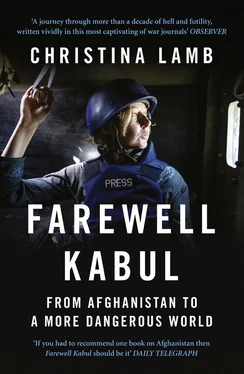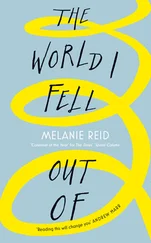The next day they were told they were being sent to join Hamid Karzai. Nobody seemed to know anything about him, other than that he was a Pashtun, and was trying to raise some kind of Southern Alliance. The information they were given did not even include a photograph. Amerine envisaged ‘some grumpy warlord, missing an eye, with a scar on his cheek who spoke no English’. He sent one of his men to the bazaar to buy a ‘really big knife we could give to our warlord, and say, “We’re here to fight with you, here’s a knife.”’
Amerine along with eleven of his Green Berets was flown to the Pakistani airbase Jacobabad, in the southern province of Sindh, which the Americans were secretly using. Karzai and his men were waiting there. They had already been into Afghanistan, but had found themselves woefully ill-equipped. ‘We weren’t prepared at all,’ Karzai later told me. ‘I went in just in a shalwar and vest, and we ended up sleeping on mountains. It was so cold, even curled up. We finally got to Tarin Kowt [capital of Uruzgan], but people told us there were still lots of Taliban and we should go back.’2
Some of the people he met up with betrayed them, and the Taliban came in pursuit. But Karzai got a message out on his CIA phone, and was luckier than Haq – helicopter-borne US Navy Seals flew in to rescue them and take them to Jacobabad.
When Amerine met the less than athletic Karzai, he was astonished. Instead of a warlord, he found an educated and dignified man speaking impeccable English. ‘In some ways his total lack of military experience made it easier,’ said Amerine. ‘I knew immediately there would be no games, no swaggering or posturing – this was someone I’d be able to talk to.’ He left what had become known as ‘the BFK’ (Big F—ing Knife) in his backpack.
Karzai was accompanied by seven or eight tribal leaders who also did not look as if they would be much use on a battlefield. ‘Most were older, they seemed tired and a couple looked kind of frail,’ recalled Amerine. ‘We figured out he had no forces pretty quickly.’ Only one man stood out. ‘There was this guy Bari Gul with an angry scowl on his face the whole time, he looked a real fighter.’
Karzai seemed unfazed by the task ahead, despite what had happened to Abdul Haq and his own narrow escape. He told Amerine he didn’t think they would have to fight at all. ‘He believed we’d pretty well show up in Uruzgan, that the main town of Tarin Kowt would rise up and that would be it, the Taliban would surrender.’ Amerine was less convinced. ‘If it’s peaceful that’s great, but we’ll plan for it to be a lot more difficult,’ he told him.
While we in the media sat in our hotels in Quetta watching the bombing on TV, Amerine, Karzai and their men gathered around a large map of southern Afghanistan every day for a week, drinking endless cups of green tea, and formed a plan.
In Amerine’s eyes the aim was to ‘infiltrate, grow a force, lay siege to Tarin Kowt, then grow a bigger force and slowly make our way to Kandahar and compel the Taliban to surrender, which would be the end of them’.
Their maps were so poor that they didn’t even know there was only one road between Tarin Kowt and Kandahar. Also, Amerine had never actually raised an army anywhere. Nor was he pleased to discover that he was supposed to take Karzai’s CIA handler Casper and four other agents, which would mean he could take fewer of his special forces team than he wanted.
When Karzai asked Amerine about America’s long-term plans for Afghanistan, he had to admit he had no idea.
There was another problem. Amerine’s commander, Colonel John Mulholland, had given orders that they were not to go into Afghanistan unless Karzai had at least three hundred men on the ground. ‘He meant three hundred bright smiling faces greeting us,’ said Amerine. ‘Karzai said there are more than three hundred men, but they won’t gather unless I go in.’ As it was, on the night they chose to infiltrate because the moon would be at its lowest, Amerine couldn’t reach Mulholland on the phone. Mulholland’s deputy told them to go ahead.
They needed to get going. The bombing campaign was having a quicker impact than expected, and by the time they set off on 14 November, Kabul had already fallen. It was around midnight when Karzai and his seven tribal elders, Captain Amerine and his eleven-man team, and the CIA agent Casper and four more spooks, climbed into five heavily armed Black Hawk helicopters which would drop them deeper behind enemy lines than any other Americans. The soldiers were in camouflage, and most sported beards grown over the previous month to help them blend in with the locals, though close up their thickly muscled builds would give them away. Apart from their weapons and personal GPS, each carried a so-called ‘blood chit’ with a message in seven local languages. ‘I am an American and do not speak your language,’ it read. ‘I will not harm you. I bear no malice towards your people.’
The infiltration was a disaster. One of the helicopters was blown off course by all the dust and dropped four of Amerine’s men in the wrong place, which meant the rest had to wait half the night for them to show up. When the weapons and equipment were airdropped, hundreds of Afghans appeared from the mountains and stole everything, including laptops and the SOFLAM for calling in airstrikes. The Americans were taken to a village on a bend in the Helmand River that was not the place for which they had meticulously planned and studied. It was also clear that Karzai had few people.
Even so, Amerine believed the plan could work, because they would build the force bit by bit. He estimated they would need six months to take Tarin Kowt. He had reckoned without the Afghans. After just three days he got a note from Karzai to say that the people of Tarin Kowt had risen up and taken the town from the Taliban. Amerine was flabbergasted. It turned out that the townspeople had heard that Kabul had fallen to the Northern Alliance, so they stormed the palace of the Taliban Governor of Uruzgan, dragged him out and hanged him. They then drove out the remaining Taliban and declared the town free. To Amerine, this was a disaster. The powerbase of the Taliban was the south, and Uruzgan was Mullah Omar’s home province. Amerine was convinced the Taliban leader and his men would not give that up so easily.
Karzai commandeered some local pick-ups and a bus, and they moved into Tarin Kowt that evening and set up headquarters in a compound. Hours later, as they were about to eat dinner, a message came that an enormous Taliban convoy was on its way from Kandahar to retake Tarin Kowt. Eighty vehicles, they were told. Even allowing for Afghan exaggeration, Amerine was worried. ‘Doing the math in my head, that was a lot of guys.’
He asked Karzai to round up all able-bodied men from the town. After half the night Karzai had managed to find only thirty men. They borrowed some vehicles and drove off, having to stop for petrol on the way. Just south of Tarin Kowt they found an ideal vantage spot from which to protect the town, a bluff that overlooked a wide valley through which the Taliban would have to pass. The men positioned themselves along the ridge, some of the Afghans smoking hashish, and Amerine’s radio operator called in air cover. Soon three F18s were hovering high above at around 30,000 feet.
It was not long before one of Amerine’s men spotted something glinting between the hills. It was the Taliban convoy, so long that it looked like an endless snake. Amerine’s radio operator contacted the US pilots overhead and pronounced the vehicles ‘cleared hot’, meaning they could start bombing. The first bomb missed, but the second hit the lead vehicle, turning it to dust and flame. However, when Amerine turned around, his own Afghan fighters were all jumping in their trucks to flee. They had never witnessed American air power before. Without Karzai, who had stayed back in town, Amerine had no translator to explain to them that the airstrikes were theirs, and they should stay.
Читать дальше












